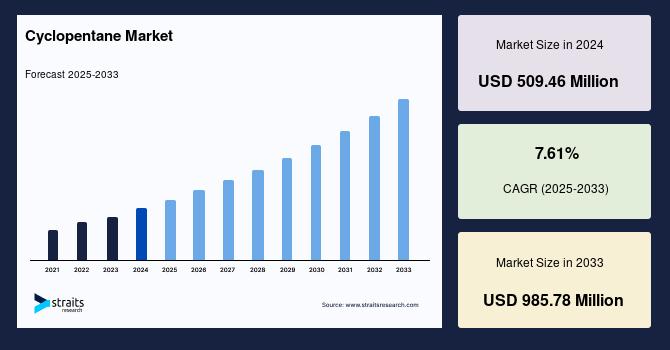Cyclopentane Market: Driving Sustainable Growth in Insulation and Refrigeration

The global cyclopentane market was valued at USD 509.46 million in 2024 and is projected to reach from USD 548.23 million in 2025 to USD 985.78 million in 2033, growing at a CAGR of 7.61% over the forecast period (2025-2033). This growth is propelled by increasing demand for energy-efficient appliances, the construction industry's expansion, and stringent environmental regulations pushing greener alternatives in blowing agents for polyurethane foams.
Understanding Cyclopentane and Its Applications
Cyclopentane is a flammable hydrocarbon with the molecular formula C5H10, characterized by a five-carbon ring structure. Highly valued for its excellent blowing agent properties, it is widely used in the production of rigid polyurethane foams that serve as insulation in refrigerators, freezers, and construction materials. Its environmental benefits are significant; cyclopentane boasts zero ozone depletion potential (ODP) and a negligible global warming potential (GWP), making it a preferred replacement for harmful hydrochlorofluorocarbons (HCFCs) and chlorofluorocarbons (CFCs).
Besides insulation foams, cyclopentane functions as a solvent and reagent in manufacturing synthetic resins and rubber adhesives. Its cyclic structure confers superior solubility compared to linear hydrocarbons, positioning it as a versatile chemical in specialty applications. However, due to its flammability, handling and storage require careful management to mitigate safety risks.
Market Drivers: Sustainability and Regulation
One of the strongest catalysts for cyclopentane market expansion is the global phase-out of ozone-depleting substances under international agreements like the Montreal Protocol and the Kyoto Protocol. These treaties mandate the reduction of HCFCs and hydrofluorocarbons (HFCs) due to their severe environmental impact. Cyclopentane’s adoption is propelled by its compliance with strict environmental standards, and rising demand for "green" blowing agents aligns with global efforts to reduce carbon footprints and improve energy efficiency.
The appliance sector is a significant consumer, with cyclopentane-based polyurethane foam widely used for thermal insulation in refrigerators and freezers. The push for energy-efficient home appliances, incentivized by government policies and growing consumer consciousness about sustainability, is directly translating into increased cyclopentane consumption.
Moreover, the construction industry’s growth—spurred by urbanization, infrastructure development, and the rising demand for energy-saving insulation materials—is another powerful growth driver. Cyclopentane-infused insulating boards, sandwich panels, and building components help reduce heat loss, minimize carbon emissions, and improve overall energy performance in residential and commercial buildings.
Regional Dynamics
Asia-Pacific dominates the cyclopentane market, accounting for the largest share due to rapid industrialization, increasing residential and commercial construction, and booming appliance manufacturing, particularly in countries like China and India. Favorable government policies easing foreign investment, expanding cold chain logistics infrastructure, and rising disposable income levels have collectively stimulated demand growth in this region.
Europe holds a significant market position as well, bolstered by stringent energy efficiency regulations and innovation in building insulation technologies. Countries in the European Union are actively enhancing their construction standards to reduce carbon emissions, thereby boosting demand for high-performance insulating materials containing cyclopentane.
North America's market growth is driven by the presence of major appliance manufacturers and regulatory frameworks targeting the phase-out of HCFCs and HFCs. The construction sector's need for sustainable materials aligns perfectly with cyclopentane-based solutions, further underpinning regional market expansion.
Other regions, including Latin America and the Middle East and Africa, are witnessing gradual growth fueled by increasing government spending, population growth, and the adoption of energy-efficient appliances in emerging economies.
Industry Challenges
While cyclopentane is favored for its environmental benefits, its highly flammable nature poses handling and safety concerns, which may limit market penetration in certain applications or regions. Additionally, the availability of substitute blowing agents, such as hydrocarbons like pentane and isopentane or chemical blowing agents, presents competitive challenges.
Price volatility of raw materials and disruptions in the supply chain can also affect production costs and market stability. However, ongoing technological advancements and investments in safety protocols are helping mitigate these risks, ensuring a balanced growth trajectory for cyclopentane usage.
Future Outlook and Opportunities
The cyclopentane market's prospects are bright, with continued innovation in foam insulation technologies and growing demand in both the appliance and construction industries. Advances in polyurethane foam formulations that maximize thermal efficiency while minimizing environmental impact are expected to fuel demand further.
Energy efficiency standards and building codes are becoming more stringent worldwide, pushing manufacturers and builders to adopt superior insulating materials. Cyclopentane-based foams fit perfectly within this framework by enabling manufacturers to meet these evolving requirements.
Additionally, the expanding cold-chain logistics sector, critical for preserving food and pharmaceuticals, is creating incremental demand for insulated containers and refrigerators utilizing cyclopentane. This application segment is projected to expand alongside the global growth of e-commerce and refrigeration-dependent logistics.
In conclusion, the cyclopentane market sits at the intersection of environmental responsibility and industrial efficiency. Its role as a sustainable blowing agent, coupled with growing application areas and regulatory support, ensures it remains a vital component in the drive toward greener, more energy-efficient technologies across multiple industries in the years ahead.
- Art
- Causes
- Crafts
- Dance
- Drinks
- Film
- Fitness
- Food
- Games
- Gardening
- Health
- Home
- Literature
- Music
- Networking
- Other
- Party
- Religion
- Shopping
- Sports
- Theater
- Wellness


